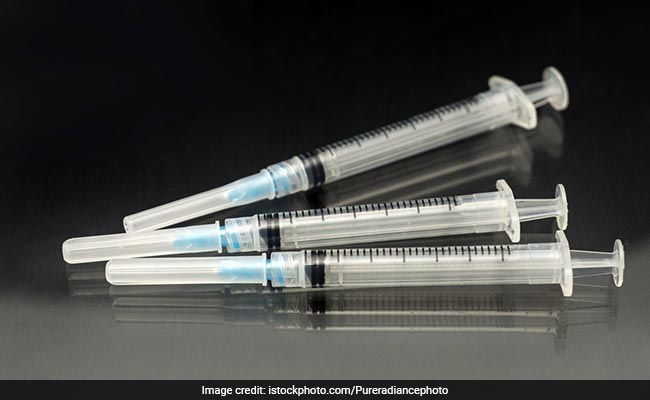Syringes should be used only under medical supervision.

Syringes should be disposed after single use
HIGHLIGHTS
- Syringes should be disposed in bins meant for needles and sharp edges
- One syringe is meant for only one single use
- Apply disinfectant on the skin before using a syringe
In Uttar Pradesh, at least 46 people have become infected with Human Immunodeficiency Virus (HIV), allegedly after a quack used the same syringe to administer injections to multiple people. The news which made headlines today, raises many concerns about the safety of using syringes. This becomes an even important concern for diabetics, who constantly use needles to inject insulins and monitor their blood glucose levels at home, with or without medical supervision. According to Dr Sushila Kataria, people using syringes at home should use them with utmost caution.
She gives the following tips of safety which people must keep in mind while using syringes at home:
1. People who are self-medicating at home must keep in mind that one syringe is only for a single time use. People should make sure that they are using disposable syringes.
2. Before applying the injection, a disinfectant is applied on the skin. This is done to sterilise the skin for removal of any kind of bacteria so that the bacteria does not enter the skin.
3. Syringes are only for single use for a single person and should be discarded after use. Even the technique of using syringes is such that after one use, they are not in a proper condition to be used again.
4. Do not throw the needle just anywhere to avoid anyone else getting hurt because of the needle.
5. People who are using syringes at home should use them only under medical supervision. Only a trained person should use a syringe for injecting medicines.
6. It should not be the case that one person is using the same syringe for himself/herself for multiple times. Infections like HIV and hepatitis are quite likely to happen in this case. Otherwise, if someone is using the same syringe again, there are chances of a sceptic and other bacterial infections on the skin.
7. People using the glucometer should be careful about not using the same needle for checking glucose levels of multiple people. If you are using the same glucometer for different people, discard the needle every time after its single use.
Other things to be kept in mind while using syringes at home are as follows:
1. Always ensure proper disposal of a syringe after one single use.
2. It is very important to learn about the correct way to dispose syringes. Dispose them only in bins that are dedicated for sharp edges and needles. These containers are easily available in pharmacies. It is important to keep syringes away from other kinds of waste as they can easily breakthrough and cause an unwanted injury.
3. Identify the kind of syringe you need to use for the respective task. Check with your doctor about the kind of syringe that you require. Using a syringe with a needle thicker or thinner can end up in an unwanted injury.
4. Never use a syringe when you are sleepy or under the influence of alcohol or drugs.
5. At times, the needle can get stuck on your skin. In such a case, make sure that you properly apply a disinfectant before using a syringe. If the needle gets stuck, wash it away with soap and water and then apply the disinfectant again to remove bacteria. Take medical help after that to avoid infections or sceptic.
(Dr Sushila Kataria is Director, Department of Internal Medicine, Medanta)
Disclaimer: This content including advice provides generic information only. It is in no way a substitute for qualified medical opinion. Always consult a specialist or your own doctor for more information. NDTV does not claim responsibility for this information.
DoctorNDTV is the one stop site for all your health needs providing the most credible health information, health news and tips with expert advice on healthy living, diet plans, informative videos etc. You can get the most relevant and accurate info you need about health problems like diabetes, cancer, pregnancy, HIV and AIDS, weight loss and many other lifestyle diseases. We have a panel of over 350 experts who help us develop content by giving their valuable inputs and bringing to us the latest in the world of healthcare.














